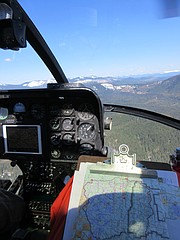Panhandle aerial wildlife surveys scheduled for January
| January 16, 2020 12:00 AM
Low-flying helicopters and airplanes will be circling over Panhandle forests during January as part of Fish and Game’s big game monitoring. Biologists will be looking for some of northern Idaho’s most prized large mammals including elk, mountain goat and moose.
Every winter, biologists across the state use aerial surveys to estimate big game numbers and ratios of adults to young, a predictive measure of population growth.
“The goal is to fly [game management] units 1, 6, and 10A this season. Specifically when and where we fly depends on the weather,” said wildlife biologist Barb Moore.
While snow can help biologists find and identify big game animals from the air, low-cloud ceilings and inclement weather often affect daily flight plans.
Helicopter crews will also capture and place GPS collars on animals to provide in-depth data on movement, survival and habitat use. Aerial and ground crews are working together to collar elk, deer, moose, mountain lion and wolves. Black bears will be captured and collared in the spring to round out the large mammal community study.
The information collected is part of a larger research effort aimed at quantifying the unique ecological interactions between predators, prey, weather and habitat in northern Idaho.
Expanded study area
Since 2014, flights focused on collaring elk in the Silver Valley, North Fork Coeur d’Alene and St. Joe River drainages. New for 2020, flights will cover portions of Bonner and Boundary Counties and the St. Maries River Basin.
“We are trying to include parts of all the northern forest habitat types,” said wildlife biologist Laura Wolf. The amount and quality of food for deer, elk and moose can vary greatly across different habitats.
Thick vegetation typical of Panhandle habitats has historically limited biologists’ ability to estimate big game numbers. Biologists now combine aerial survey data with game camera photos to get a more accurate assessment of the abundance and distribution of wildlife.
For more information contact the Panhandle Regional Office at 208-769-1414.



